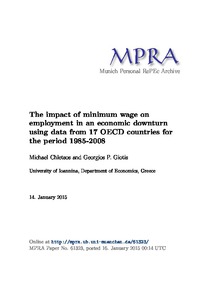The impact of minimum wage on employment in an economic downturn using data from 17 OECD countries for the period 1985-2008
"The impact of minimum wage on employment has been a field of conflicts among economists in labor economics. This divergence of views usually takes the form of conflicting empirical studies. However, in our research we managed to find only one study on the employment effect of minimum wages dur...
| Main Authors: | , |
|---|---|
| Institution: | ETUI-European Trade Union Institute |
| Format: | TEXT |
| Language: | English |
| Published: |
Munich
2014
MPRA |
| Subjects: | |
| Online Access: | https://www.labourline.org/KENTIKA-19115568124919337409-The-impact-of-minimum-wage-on-.htm |
| Summary: | "The impact of minimum wage on employment has been a field of conflicts among economists in labor economics. This divergence of views usually takes the form of conflicting empirical studies. However, in our research we managed to find only one study on the employment effect of minimum wages during economic recessions using cross-country evidence. In this paper we try to investigate this issue using a sample of 17 OECD countries with data for the period 1985-2008. We also try to account for institutional and other policy related differences that might have an impact on employment other than the minimum wage. Our empirical analysis points a positive effect of minimum wage on employment and labor force participation rate for teenagers, young adults and youth, but negative effect for the prime-aged and those who belong in the age group 55-64 years old. Regarding the economic circle, we find that, generally in economic downturns our initial results for all age groups do not change significantly." |
|---|---|
| Physical Description: | 54 p. Digital |

